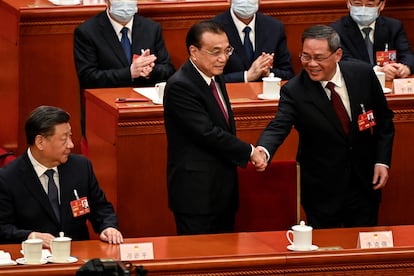China names Li Qiang premier nominally in charge of economy
Li was nominated by Xi and appointed to the position at Saturday morning’s session of the National People’s Congress, China’s ceremonial parliament

China on Saturday named Li Qiang, a close confidant of top leader Xi Jinping, as the country’s next premier nominally in charge of the world’s second-largest economy now facing some of its worst prospects in years.
Li was nominated by Xi and appointed to the position at Saturday morning’s session of the National People’s Congress, China’s ceremonial parliament. That came a day after Xi, 69, secured a norms-breaking third five-year term as state leader, setting him up to possibly rule for life.
Li is best known for having enforced a brutal “zero-COVID” lockdown on Shanghai last spring as party boss of the Chinese financial hub, proving his loyalty to Xi in the face of complaints from residents over their lack of access to food, medical care and basic services.
Li, 63, came to know Xi during the future president’s term as head of Li’s native Zhejiang, a relatively wealthy southeastern province now known as a technology and manufacturing powerhouse.
Prior to the pandemic, Li built up a reputation in Shanghai and Zhejiang before that as friendly to private industry, even as Xi enforced tighter political controls and anti-COVID curbs, as well as more control over e-commerce and other tech companies.
As premier, Li will be charged with reviving a sluggish economy still emerging from the COVID-19 pandemic and confronted with weak global demand for exports, lingering U.S. tariff hikes, a shrinking workforce and an aging population.
He takes on the job as authority of the premier and the State Council, China’s Cabinet, has been steadily eroding as Xi shifts more powers to bodies directly under the ruling Communist Party.
At the opening of the annual congress session on Sunday, outgoing Premier Li Keqiang announced plans for a consumer-led revival of the struggling economy, setting this year’s growth target at “around 5%.” Last year’s growth fell to 3%, the second-weakest level since at least the 1970s.
As with Xi’s appointment on Friday, there was no indication that members of the NPC had any option other than to endorse Li and other officials picked by the Communist Party to fill other posts.
Unlike Xi, who received the body’s full endorsement, Li’s tally included three opposed and eight abstentions.
The nearly 3,000 delegates deposited ballots into boxes placed around the vast auditorium in the Great Hall of the People, in a process that also produced new heads of the Supreme People’s Court and the state prosecutor’s office, and two vice chairmen of the Central Military Commission that commands the party’s military wing, the 2 million-member People’s Liberation Army.
Xi was renamed head of the commission on Friday, an appointment that has been automatic for the party leader for three decades. The premier has no direct authority over the armed forces, who take their orders explicitly from the party, and plays only a marginal role in foreign relations and domestic security.
Xi’s new term and the appointment of loyalists to top posts underscore his near-total monopoly on Chinese political power, eliminating any potential opposition to his hyper-nationalistic agenda of building China into the top political, military and economic rival to the U.S. and the chief authoritarian challenge to the Washington-led democratic world order.
Sign up for our weekly newsletter to get more English-language news coverage from EL PAÍS USA Edition
Tu suscripción se está usando en otro dispositivo
¿Quieres añadir otro usuario a tu suscripción?
Si continúas leyendo en este dispositivo, no se podrá leer en el otro.
FlechaTu suscripción se está usando en otro dispositivo y solo puedes acceder a EL PAÍS desde un dispositivo a la vez.
Si quieres compartir tu cuenta, cambia tu suscripción a la modalidad Premium, así podrás añadir otro usuario. Cada uno accederá con su propia cuenta de email, lo que os permitirá personalizar vuestra experiencia en EL PAÍS.
¿Tienes una suscripción de empresa? Accede aquí para contratar más cuentas.
En el caso de no saber quién está usando tu cuenta, te recomendamos cambiar tu contraseña aquí.
Si decides continuar compartiendo tu cuenta, este mensaje se mostrará en tu dispositivo y en el de la otra persona que está usando tu cuenta de forma indefinida, afectando a tu experiencia de lectura. Puedes consultar aquí los términos y condiciones de la suscripción digital.








































